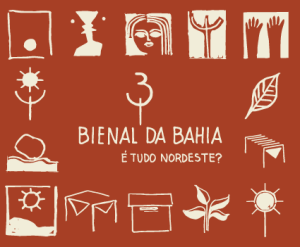3rd Bahia Biennale
É Tudo Nordeste? (Is Everything Northeast?)
May 29–September 7, 2014
Opening: May 29 (first season); July 17 (second season)
Museu de Arte Moderna da Bahia (MAM-BA)
Av. Contorno s/n – Solar do Unhão
40060-060 Salvador (BA)
Brazil
In 1968 the State of Bahia launched the second edition of its Arts Biennale, which lasted just two days. Ten of the artworks exhibited were considered “subversive” and duly confiscated, their authors arrested, some of them tortured or forced into exile. The project of having a privileged venue for contemporary arts in Brazil out of the dominant scene of São Paulo and Rio de Janeiro was thus aborted, and a whole generation of artists had to work within a circumscribed, limited dialogue, stuck in the outskirts of the globalized art circuit and its markets.
Closing a gap of 46 years, the state of Bahia resumes now its Biennale of visual arts as a continuity of the 1966 and 1968 editions. It brings back the intentions of the original project: establishing a counter-discourse that is suitable for creating, promoting and establishing alternative routes in the art field, without the need to depend on legitimation from other national and international centers. The Biennale also updates the original project to the current Brazilian and international contexts, where the concepts of center and periphery are being redefined.
É Tudo Nordeste? (Is Everything Northeast?) is the question that permeates the curatorial project and sets the tone of the 100-day program, including exhibitions, performances, film cycles, educational actions, happenings, and public meetings with artists, curators and critics.
It questions the constitutive processes of the cultural and historical experience of the Northeast from the point of view of Bahia and its dialogue with Brazil and abroad, discussing the permanence or the failure of concepts such as regionalism, determinism, and the physical and mental occupation of territories.
The 3rd Bahia Biennale is not just a showcase of contemporary output, but a continuous process. Its aim is to offer possible contexts for artistic creation and research, to the discovery of lost archives and collections, and to the interplay between memory and present perception, generating an ambience propitious for in-depth debates about contemporary arts.
The Biennale will be officially inaugurated by Bahia state governor Jaques Wagner at São Bento monastery in Salvador with the opening of the Reenactment Exhibition, a transmediatic experience bringing together artworks and documents from the censored Biennale of 1968, together with original interventions by contemporary artists.
Among the main action fields proposed by the Biennale, the Archive and Fiction Working Group was set to exchange experiences, research and content production about artistic practices and archival procedures. Throughout its workshops, lost archives and collections are being identified and mapped, offering a broad range of materials for commissioned artists to carry out artworks specially designed for the 3rd Biennale.
Within the Critical Gravitational Field, the Biennale also brings original artwork by Brazilian and international curators, such as Roger Buergel, who will also join Lisette Lagnado and Gerardo Mosquera in a real-time critical assessment of the actions being performed throughout the Biennale’s 100 days.
A whole generation of Bahia artists working since the 1960s and 1970s whose works have only recently been noticed in the arts circuit will also be contemplated with comprehensive exhibitions: Rogério Duarte, Juarez Paraíso, Juraci Dórea, Dicinho, Edinízio, among others.
The 3rd Bahia Biennale is a project of Secretaria de Cultura do Estado da Bahia (State of Bahia’s Culture Department), organised by Bahia’s Museum of Modern Art (MAM-BA) through a joint venture between Hansen Bahia Foundation and Instituto do Patrimônio Artístico e Cultural (IPAC – Institute for the Cultural and Artistic Heritage). The Biennale curatorship is led by MAM-BA director Marcelo Rezende, assisted by Ana Pato and Ayrson Heráclito (chief curators), Fernando Oliva and Alejandra Muñoz (co-curators).
All events and schedule subject to change.
For more information
Eduardo Simantob: eduardo@bienaldabahia.com / T +55 71 9114 8044


